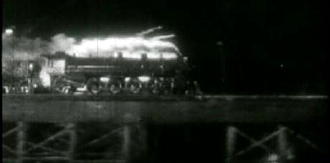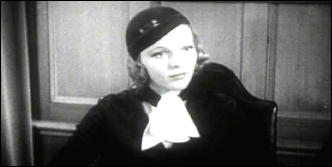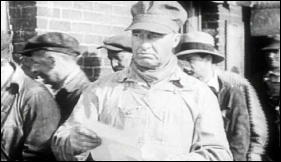Mon 13 Aug 2012

THE PHANTOM EXPRESS. Majestic Pictures, 1932. William Collier Jr., Sally Blane, J. Farrell MacDonald, Hobart Bosworth, Axel Axelson, Lina Basquette, Eddie Phillips. Director: Emory Johnson.
There are some good moments in this semi-supernatural-thriller-with-a-logical-explanation movie, but they’re separated in the middle by a lengthy scene that makes no sense at all.
Starting at the beginning, though, an engine with a lengthy component of railroad cars is derailed when it tries to stop too quickly rounding a curve heading straight for what appears to be a train coming directly toward them. Funny thing is, there was no train. None passed the signal posts along the tracks farther down the line, and none was seen by the survivors once the accident happened.

Two of the survivors are the engineer (J. Farrell MacDonald), who is blamed, and his best buddy, the fireman (Axel Axelson, whose first and only movie this was, and whose Swedish-sounding accent is a delight all the way through). Investigating the crash is the president of the company’s son (William Collier, Jr.) , a ne’er-do-well who decides to change his way once he spots the beautiful girl (Sally Blane) who is the engineer’s daughter.
There are any number of scenes with the boss’s son working in the railroad yard, making this movie an outright bonanza for fans of old trains. My grandfather and great-grandfather both worked on cross-country trains, so you can count me in as one of those very pleased to see them. No fake sets here. This was the real deal.

Overall, though, the mix of comedy with tragedy is an uneasy one in this would-be thriller than doesn’t really have many thrills in it. The scene in the middle is a strange one, as a gang of the bad guys attack a couple of signal posts unmasked, tie up the workers inside, and force them to watch as the invisible train zooms by. For what reason, I do not know. No investigation is made of the incident – you’d thing the police would have at least a passing interest in it – and in fact, it is not mentioned again.
Could the ingenious trick that was played be copied in real life? It’s ingenious, all right, but I wouldn’t go any further than that. Maybe it suffices to say, “Only in the movies!â€